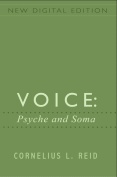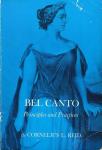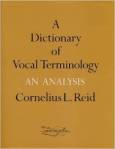The following descriptions were taken from the published book jackets.
Click the title or image to purchase.

In his second book, The Free Voice (1965), Reid formulates his own teaching principles, which are based firmly upon the old principles but made contemporary in their statement and more clearly articulated because of their consonance with twentieth-century findings as to the physical value of the vocal instrument.
In his first book, Bel Canto: Principles and Practices (1950), Reid takes a closely reasoned look at his subject and makes a strong case for his contention that proper vocal training always was and still is concerned notwith the making of any particular kind of sound but with a vocal function that allows the singer the fullest possible use of his or her particular instrument, whether for lyric or dramatic purposes.

In the third book, Voice: Psyche and Soma (1975) [which completes a trilogy of books clearly defining his school of functional vocal training] Reid both clarifies still further his earlier formulations and also deals at some length with the complex interplay that takes place during training and performing, between psychological factors, acts of will, and the ability to respond to the initial concepts which launch the vocal process.
This Dictionary is a major work in musicology, a central reference for the teacher, the student, the professional vocalist, the scientist, and the interested layman. In entries that range from pithy single phrases to essay-length critical surveys, Mr. Reid explores the proposals and counterproposals, the understandings and misunderstandings, that have made modern vocal discipline a dumping-ground for displaced terminologies. The material presented in this book is much more than a dictionary in the commonly understood sense; for by examining the terms, Mr. Reid examines also the concepts, the habits of thought, and everyday practice that lie behind the terms.
This collection of essays represents more than a half century of continuous refinement of Reid’s teaching methods. Reid’s findings point the way to a rebirth of the largely misunderstood principles of the Bel Canto era. It points out that the principles of voice training are in direct conformity with Nature’s laws and that the vocal mechanism, like all organic systems, interacts with its environment on an ecological plane. When the voice is given proper growth stimulus in the form of selected vocal exercises, muscles are reconditioned to react in a natural way that allows the voice to respond to its own growth needs.
The Modern Singing Master is a compilation of essays written by renowned singing teachers as their testament to their great singing instructor, Cornelius Reid, who enabled them to really understand how to sing and how to teach singing to their students. Reid is often honored as the “philosopher of singing.” The essays explain the four basic principles with which he works: the two-register theory; the necessity for pure vowels; the use of rhythm to encourage the muscles to react spontaneously; and the choice of dynamic (loud or soft). His research and interpretations have given birth to a new era of voice and pedagogy known as functional voice training. This work concludes with a marvelous article written by Cornelius Reid himself on the fascinating musical journey he has taken over the past sixty years.



